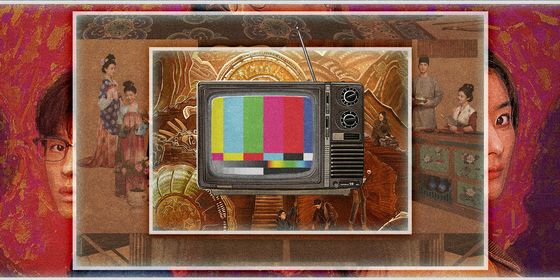Micro-dramas have taken China by storm, attracting views through over-the-top content and the promise of thought-free entertainment
It often begins with a thunderous vow: “This time, I swear I’ll take back everything that belongs to me (这一次,我发誓要拿回属于我的一切 Zhè yí cì, wǒ fāshì yào náhuí shǔyú wǒ de yíqiè)!” Shortly thereafter, a grassroots protagonist is reborn into a life of revenge, and the micro-drama (短剧 duǎnjù) that traces their messy renewal unfolds.
Light, flashy, and dangerously addictive, micro-dramas run 1 to 10 minutes per episode, and series can run into the hundreds of episodes. One second you may be scrolling social media for fun, the next you’ve accidentally binged 50 episodes of high-octane drama, or as one netizen put it: “I just can’t stop. I simply switch off my brain and keep watching. (上头了,每天脑子一扔就是看。Shàngtóu le, měitiān nǎozi yì rēng jiùshì kàn.)”
Unlike long-form dramas, which often come with the promise of “It gets better after a few episodes (熬过前几集就好了 Áoguò qián jǐ jí jiù hǎo le),” micro-dramas hook viewers immediately with irresistibly absurd, compressed plots that deliver the full gamut of emotions—highs (燃点 rándiǎn), laughter (笑点 xiàodiǎn), tears (泪点 lèidiǎn), and romance (磕点 kēdiǎn) in a short span of time.
Quality varies widely. Some embrace their shoddy acting and logic, stacking conflicts and twists for instant thrills (爽点 shuǎngdiǎn) and explosive moments (爆点 bàodiǎn), keeping viewers hooked. As one netizen writes: “[These] small studios go all in—only micro-dramas can deliver such wildly absurd, yet pleasing plots (小作坊下料就是猛,爽到抽象的剧情,也就短剧能拍出来了 Xiǎo zuōfang xiàliào jiùshì měng, shuǎng dào chōuxiàng de jùqíng, yě jiù duǎnjù néng pāi chūlái le).”
Production is notoriously fast and cheap—many micro-dramas wrap in just a week. Meanwhile, “top-stream micro-drama actors (短剧顶流 duǎnjù dǐngliú)” are in constant, almost frantic demand. Most shows are filmed in Hengdian (横店), in eastern China’s Zhejiang province, nicknamed “China’s Hollywood.” But the boom of vertical-screen micro-dramas means it has garnered a new title among netizens: “Vertical-dian (竖店 shùdiàn),” a nod to the mobile-friendly format of micro-dramas and a play on “heng,” meaning horizontal. In the first quarter of 2025 alone, over 600 micro-drama crews shot there, according to the Yangtse Evening Post.
Read more about China’s evolving drama industry:
- High Stakes in Short Takes: China’s Booming Micro-Drama Business
- Podcast | How China’s Micro-Dramas Spread At Home and Abroad
- Dream Factory
What micro-dramas lack in production value, they make up for in formulaic, easy-to-digest stories and two-dimensional characters. Wrongs are avenged instantly, and grudges settled on the spot—no delay, no plot buildup—so audiences are left unencumbered by the need to think. After a long day at work, it’s easier for audiences to swallow fragmented, passive forms of entertainment, the argument goes.
Naturally, fans of such content gravitate toward series that make them exclaim: “Total satisfaction! (看得我身心舒畅!Kàn de wǒ shēnxīn shūchàng!)” It’s this “satisfying (爽 shuǎng)” feeling, coupled with a curiosity to see just how outrageous a show can get, that keeps viewers glued to their screens.
Some recent noteworthy examples include a pregnant woman who gives birth to 99 sons at once; in another, a heroine is reborn 70 years in the future as her great-grandson’s classmate. Even this was too far-fetched for some: “The scriptwriter is literally dragging my IQ through the mud. I need to wash my brain. Something dirty got in there. (编剧就是纯纯把我的智商按在地上摩擦,我去洗洗脑子,有脏东西进去了。Biānjù jiùshì chúnchún bǎ wǒ de zhìshāng àn zài dìshang mócā, wǒ qù xǐxi nǎozi, yǒu zàng dōngxi jìnqù le.)”
A now classic setup involves a heroine born into poverty and hardship, working as a servant in a wealthy household and bearing the injustices of a degenerate father, a vicious stepmother, and a weak, ineffective birth mother. Despite her suffering, she remains kindhearted. Then, in quick succession, she defeats her evil rival, escapes her impoverished life, and finds love—a narrative so common that it has become known as “Cinderella’s counterattack (灰姑娘逆袭 Huīgūniang nìxí).”
Other hackneyed tropes abound: rebirth and revenge (重生复仇 chóngshēng fùchóu), face-swapping and substitute marriage (换脸替嫁 huànliǎn tìjià), forced marriage-turned-love (先婚后爱 xiānhūn hòu’ài), mutual secret crushes (双向暗恋 shuāngxiàng ànliàn), soul-swapping (灵魂互换 línghún hùhuàn), and grassroots comebacks (打脸逆袭 dǎliǎn nìxí). And regardless of storyline or setting, no drama is complete without a loud slap across the face (扇大嘴巴子 shān dà zuǐbāzi), a tearful, on-their-knees apology (下跪道歉 xiàguì dàoqiàn), and a well-timed trip between the leads, guaranteeing an “accidental” meeting of lips. And if there’s a bathtub around, you can bet someone’s hiding in it.
Grand finales more often than not involve the holy trinity of kidnapping, stabbing, and a hospital stay (绑架捅刀住院三件套 bǎngjià tǒngdāo zhùyuàn sān jiàn tào). And when someone inevitably tries to kidnap the heroine mid-recuperation, the protagonist arrives just in time, shouting: “We’ll see who dares to move her! (我看谁敢动她!Wǒ kàn shéi gǎn dòng tā!)”
If things get really bad and the heroine dies (don’t worry, she’ll magically recover at a later point), expect the male lead to lose control and scream: “I want all of you to be buried with her! (我要你们所有人为她陪葬!Wǒ yào nǐmen suǒyǒu rén wèi tā péizàng!)”
But not all micro-dramas are disposable “fast food.” More now resemble full-length shows, featuring coherent storytelling, strong acting, polished editing, and sometimes even a healthy dose of self-awareness and irony. They’re also increasingly subverting familiar tropes to achieve an “anti-trope within trope (套路里反套路 tàolù lǐ fǎntàolù)” effect. For example, in The Pen (《执笔》), female lead Su Yunqi discovers she is merely a “paper figure (纸片人 zhǐpiànrén),” a side character fated for tragedy. When forced to choose between saving her lover or herself, she chooses survival—rejecting the self-sacrifice that traditionally defines a “heroine.” By refusing the role, she can neither become one nor escape her fate—a sharp satire of rigid tropes.
Both the director and scriptwriter of The Pen are women, and with more female creators entering the industry, female portrayals are gradually shifting. Unlike many long-form dramas where heroines are deliberately portrayed as weak so that male leads can swoop in as saviors and manufacture “artificial sweetness (工业糖精 gōngyè tángjīng),” micro-dramas like The Pen feature heroines who are resilient, unyielding, unapologetic, and actively pursue self-realization.
Meanwhile, traditional dramas and films face scrutiny. Few blockbuster series have emerged in recent years, and uneven film quality makes audiences ask: “If I can finish a 100-episode micro-drama in two hours, why gamble my time on a ‘blind box’ at the cinema? (两个小时就能刷完一部上百集的微短剧,谁还愿意花时间去电影院开‘盲盒’?Liǎng gè xiǎoshí jiù néng shuāwán yí bù shàng bǎi jí de wēiduǎnjù, shéi hái yuànyì huā shíjiān qù diànyǐngyuàn kāi ‘mánghé’?)”
So, whether you love them or loathe them, the booming market for such content means that the “Micro-Drama Nation (短国 duǎnguó)” won’t fall anytime soon.












